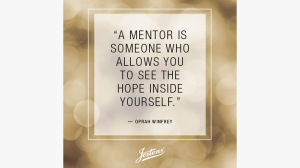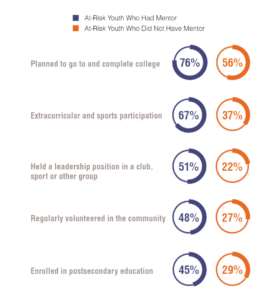Sometimes we think of mentors narrowly as those who sign up through a formal mentorship program to spend time with a young person. In addition to these “formal” mentors, informal or everyday mentors can be any trustworthy adult who offers support, guidance and encouragement to help young people overcome challenges and become their best selves.
Five Essential Actions of Mentors: What Do Mentors Do That Matter?
What specific actions can adults take in their relationships with young people that help students learn, grow, and thrive? Search Institute’s newest research identifies five essential actions that lay the foundation for a powerful mentoring relationship:
1. Express Care
Students value relationships with adults who show they genuinely like them and want the best for them. These relationships help young people know they really matter.
2. Challenge Growth
Students value relationships with adults who insist that they do their best to learn, grow and improve.
3. Provide Support
Students value relationships with adults who offer tangible, appropriate feedback and guidance in completing tasks and achieving goals — without taking over and doing it for them.
4. Share Power
Students value relationships with adults in which they feel their voices are heard and they share in making decisions that affect them. This helps students develop self-confidence and self-direction.
5. Expand Possibility
Students value trustworthy adults who help them broaden their horizons and connect them to opportunities for learning, growth and discovery.
The Value of Mentors for Youth Facing Risks
About one-third of young people — nearly 16 million — grow up without a non-parent adult in their lives who offers guidance, support and encouragement. Not having such a mentor is particularly likely for the estimated 9 million young people who grew up dealing with high risks, such as those who are disengaged from school and work, are homeless or have incarcerated parents. Among youth facing these greater risks, those who had a mentor were more likely to have had positive outcomes, including the following, based on interviews with 1,109 young adults (ages 18 to 21):
What Relationships with Trustworthy Adults Offer
Besides their parents, kids need to have strong relationships with other trustworthy and caring adults. Relationships with other adults help young people:
- Expand their ideas about who they might be in the future
- See themselves through someone else’s eyes, which helps them form a sense of themselves that is distinct from their parents
- Receive adult guidance and support that they may not be open to from their parents
The Value of Mentors for Young People
Young people who have positive non-parents in their lives (“natural mentors”) are more likely to:
- Be more engaged in school
- Complete high school and go to college
- Be more satisfied in life
- Be more engaged in school
- Engage in good health behaviors
- Engage in fewer high-risk behaviors, including drug use and violence
The Value of Informal Mentoring in School
When students experience naturally occurring mentoring relationships (informal mentoring) with school staff, they are more likely to report positive thoughts about their schools and their fellow students. They are also less likely to engage in high-risk behaviors, including violence and use of alcohol, tobacco and other drugs, according to a study of 3,320 students from 65 high schools in eight states.
“ Whether the burdens come from the hardships of poverty, the challenges of parental substance abuse or serious mental illness, the stresses of war, the threats of recurrent violence or chronic neglect, or a combination of factors, the single most common finding is that children who end up doing well have had at least one stable and committed relationship with a supportive parent, caregiver or other adult.” — National Scientific Council on the Developing Child (2015)
Jostens partnered with Search Institute to provide research-based data and advice for dealing with common school challenges. Over the past 30 years, Search Institute has studied the strengths and difficulties in the lives of more than five million middle and high school youth across the country and around the world to understand what kids need in order to succeed. Like Jostens Renaissance, Search Institute focuses on young people’s strengths, rather than emphasizing their problems or deficiencies. Visit SearchInstitute.org to learn more.
Below you will find the Mentors that Matter guide. Download a PDF with class activities, statistics, research and references around mentorship.
WANT TO USE JOSTENS RENAISSANCE?
If you are a Jostens customer and you need a login to access all the resources on JostensRenaissance.com, email your rep or click here.
If you don’t currently partner with Jostens for yearbooks or graduation regalia or other celebratory products, you can learn more here.



